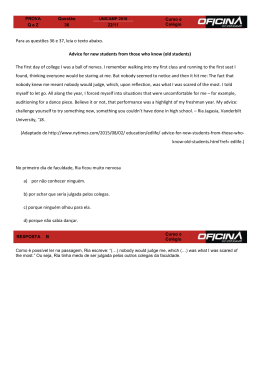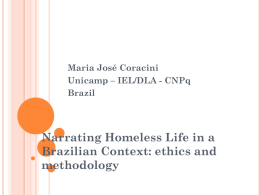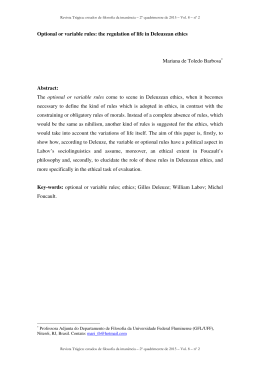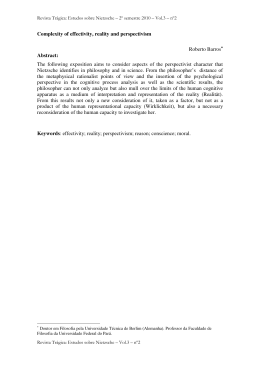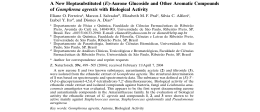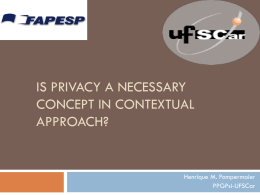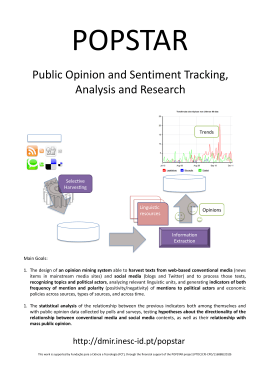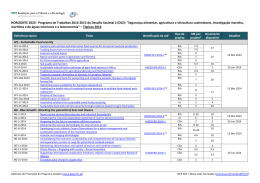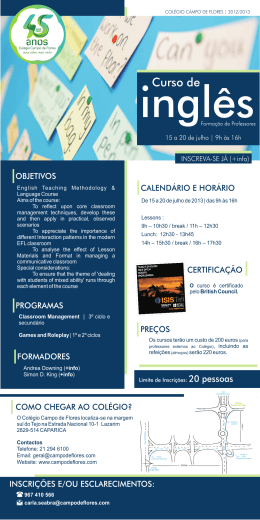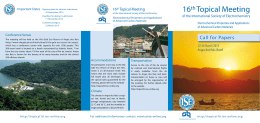Universidade Federal do Rio de Janeiro Instituto de Matemática Programa de Pós-Graduação em Ensino de Matemática Doutorado em Ensino e História da Matemática e da Fı́sica Seleção 2015 – Etapa 1 – Inglês Trecho do Texto History, Philosophy, and Science Teaching: The Present Rapprochement Michael R. Matthews HPS AND TEACHER EDUCATION Many have argued that HPS should be part of the education of science teachers – the British Thomson Report in 1918 had said ‘some knowledge of the history and philosophy of science should form part of the intellectual equipment of every science teacher in a secondary school’ (p. 3). One argument for HPS is that it produces better (more coherent, stimulating, critical, humane, etc.) teaching. This utilitarian argument is not the only one: a case can be made for teachers having critical knowledge (meaning historical and philosophical knowledge) of their subject matter quite independently of whether this knowledge is directly used in pedagogy – there is more to a teacher than meets the classroom. Michael Polanyi made the obvious point that HPS should be as much a part of science education as literary and musical criticism is part of literary and musical education (Harre 1983, p. 141). It would be odd to think of a good literature teacher who has no knowledge of the elements of literary criticism: of the tradition of debate over what identifies good literature, how literature is related to social interests, the history of literary forms etc. So also it should be equally odd to think of a good science teacher who has no reasonably sophisticated knowledge of the terms of their own discipline – ‘cause’, ‘law’, ‘explanation’, ‘model’, ‘theory’, ‘fact’; no knowledge of the often conflicting objectives of their own discipline – to describe, to control, to understand; or no knowledge of the cultural and historical dimension of their own discipline. Israel Scheffler in a largely neglected paper of 1970 argued just this point. This is part of the difference between being educated in science and being simply trained in science: teachers ought to be educated. HPS clearly contributes to this richer understanding of science. This is a point of connection to the voluminous literature on scientific literacy: if to be literate is to have some depth of understanding of the words and concepts of a discourse, then the history and philosophy of science clearly contributes to a deeper and more critical scientific literacy (Miller 1983). To advocate the importance of the history and philosophy of science for science teachers is not novel. The opening pages of a 1929 text for science teachers describes a successful science teacher as one who: knows his own subject. . . is widely read in other branches of science. . . knows how to teach. . . is able to express himself lucidly. . . is skilful in manipulation. . . is resourceful both at the demonstration table and in the laboratory. . . is a logician. . . is something of a philosopher. . . is so far an historian that he can sit down with a crowd of boys and talk to them about the personal equations, the lives, and the work of such geniuses as Galileo, Newton, Faraday and Darwin (quoted in Sherratt 1983, p. 418). This ideal has current relevance. As has been mentioned, the new curricula being developed and implemented in Britain, the US, Denmark, and Canada will require just such qualities in a teacher if they are to be successfully taught. Episodes in the history of science, and questions about the nature (philosophy) of science are part of these curricula. Furthermore in Britain, the US, Australia and elsewhere there are efforts to identify outstanding science teachers and to assess teachers. This requires delineating the qualities of a good science teacher; and increasingly some competence or familiarity with HPS topics is being required. 1 In the US, the Stanford-based, Carnegie-funded, National Teacher Assessment Project, directed by Lee Shulman, is the foremost teacher assessment programme. It is intellectualist in its criteria of teacher competence and rejects the behaviourist, managerial, measures of teacher competence so long enshrined in evaluation practice. Shulman asks about the ‘missing paradigm’ – the command of subject matter – and the ability to make it intelligible to students, abilities requiring the wider view provided by HPS. In one of his influential publications, Shulman has said: To think properly about content knowledge requires going beyond knowledge of the facts or concepts of a domain. It requires understanding the structures of the subject matter. . . Teachers must not only be capable of defining for students the accepted truths in a domain. They must also be able to explain why a particular proposition is deemed warranted, why it is worth knowing, and how it relates to other propositions, both within the discipline and without, both in theory and in practice. (Shulman 1986, p. 9). To explain why a particular proposition is deemed warranted – the law of inertia, the principle of conservation of energy, the theory of evolution, continental drift theory, accounts of atomic structure etc. – requires knowing something about how evidence relates to theory appraisal, this is the standard business of epistemology. Shulman’s ideas are reflected in the National Board for Professional Teaching Standards assessment guidelines – What Teachers Should Know and Be Able to Do (1989). An evaluation package for biology teachers that has been developed as part of the Carnegie project tries to assess teachers grasp of the nature of science, its processes, and determinants. In their words ‘Do teachers hold a rich conception of the scientific enterprise as an interaction of the facts, laws and theories of a domain, mastering the skills to construct such knowledge, and recognising that this knowledge is influenced by and has influence on human society’ (Collins 1989, p. 64). As the history and philosophy of science becomes a more recognised component of teacher education it is timely to ask what kind of HPS courses are appropriate. Recent literature contains accounts of a number of such courses, and reflections upon their adequacy. A consensus is that for such courses to be seen as relevant to a prospective teacher they should be applied, or practical courses. Sending education students to a Philosophy Department to do HPS is not the most satisfactory way of proceeding. To use the words of Bevilacqua, who has been promoting HPS among teachers in Italy, such courses become yet another ‘brick in the wall’, or another chore to be completed before getting on to teaching. HPS courses should begin with problems that teachers can see as pertinent to their teaching or professional development. Such courses are described in Johnson and Stewart (1990), Eger (1987), Bybee (1990), Bakker and Clark (1989), and Ruse (1990). My own course (Matthews 1990b) which has run with some success for a number of years, is based upon selections of the writings of Galileo, Boyle, Newton, Huygens, Darwin and others. I have found, not surprisingly, that teachers appreciate the opportunity to read something of their work. From hundreds of biology graduates I have found only a handful who have read any writing of Darwin; from hundreds of physics graduates I have encountered none who have read anything from Galileo or Newton. As one teacher stated ‘teachers are hungry for this knowledge’. The philosophical issues – realism, instrumentalism, authority, reductionism, causality, explanation, idealization etc. are dealt with and developed as they arise out of the text. Most of the texts used have been published in Matthews (1989b). Extraı́do de: Matthews, M.R. (1992). History, Philosophy, and Science Teaching: The Present Rapprochement Science & Education, 1, p. 11-47. Vocabulário dado: • HPS – Abreviação usada pelo autor para History and Philosophy os Science. 2 O artigo de M.R. Matthews, publicado no primeiro número da revista Science & Education, em 1992, levanta os usos e argumentos para que sejam usados elementos da História e da Filosofia da Ciência nos cursos de ciências nas escolas. O trecho selecionado refere-se à importância da História e Filosofia da Ciência (HPS) para a formação, ou educação, de professores. Responda às questões a seguir, com base no trecho do texto dado. Questão 1. Para o autor, o argumento utilitário para que a história e filosofia da ciência façam parte da educação dos professores de ciências refere-se a que (A) (B) (C) (D) os professores usarão este conhecimento diretamente na pedagogia. o ensino de ciências ficará melhor. os professores terão maior senso crı́tico. os professores terão maior conhecimento histórico e filosófico. Questão 2. O autor defende que é estranho pensar num bom professor de ciências sem um conhecimento (A) (B) (C) (D) dos elementos do criticismo literário. dos termos “causa”, “lei”, “explicação”, “modelo”, “teoria”, “fato”. dos objetivos conflitantes da disciplina: descrever, medir e relatar. do conhecimento das dimensões culturais, históricas e pedagógicas de sua disciplina. Questão 3. Segundo o autor, a defesa da importância da história e filosofia da ciência para os professores de ciências (A) (B) (C) (D) é presente pelo menos desde a década de 1920. não existia antes da década de 1980. é atual (da época em que o artigo foi escrito). inexistente na época em que o artigo foi escrito. Questão 4. O autor afirma que: (A) Uma vez reconhecida a história e filosofia da ciência como um componente da formação de professores de ciências, cabe perguntar que tipo de curso sobre o assunto é adequado. (B) Uma vez reconhecida a história e filosofia da ciência como um componente da formação de professores de ciências, qualquer tipo de curso sobre o assunto é apropriado. (C) Mesmo sem reconhecer da importância da história e filosofia da ciência como um componente da formação de professores de ciências, é oportuno perguntar que tipo de curso sobre o assunto é adequado. (D) Se a história e filosofia da ciência for reconhecida como um componente da formação de professores de ciências, será oportuno perguntar se algum tipo de curso sobre o assunto é adequado. Questão 5. O autor comenta que em seu próprio curso, ele emprega (A) textos escritos por ele próprio sobre os trabalhos de cientistas importantes. (B) textos escritos por estudantes de biologia e de fı́sica sobre os trabalhos de cientistas importantes. (C) seleções de textos originais de cientistas importantes. (D) textos diversos sobre a biografia pessoal e cientı́fica de cientistas importantes. 3 Questão 6. Faça uma versão livre para o português dos seguinte trecho do texto. Shulman asks about the ‘missing paradigm’ – the command of subject matter – and the ability to make it intelligible to students, abilities requiring the wider view provided by HPS. In one of his influential publications, Shulman has said: To think properly about content knowledge requires going beyond knowledge of the facts or concepts of a domain. It requires understanding the structures of the subject matter. . . Teachers must not only be capable of defining for students the accepted truths in a domain. They must also be able to explain why a particular proposition is deemed warranted, why it is worth knowing, and how it relates to other propositions, both within the discipline and without, both in theory and in practice. (Shulman 1986, p. 9). To explain why a particular proposition is deemed warranted – the law of inertia, the principle of conservation of energy, the theory of evolution, continental drift theory, accounts of atomic structure etc. – requires knowing something about how evidence relates to theory appraisal, this is the standard business of epistemology. Shulman’s ideas are reflected in the National Board for Professional Teaching Standards assessment guidelines – What Teachers Should Know and Be Able to Do (1989). 4 Gabarito das questões objetivas: Questão 1. B Questão 2. B Questão 3. A Questão 4. A Questão 5. C 5
Download
